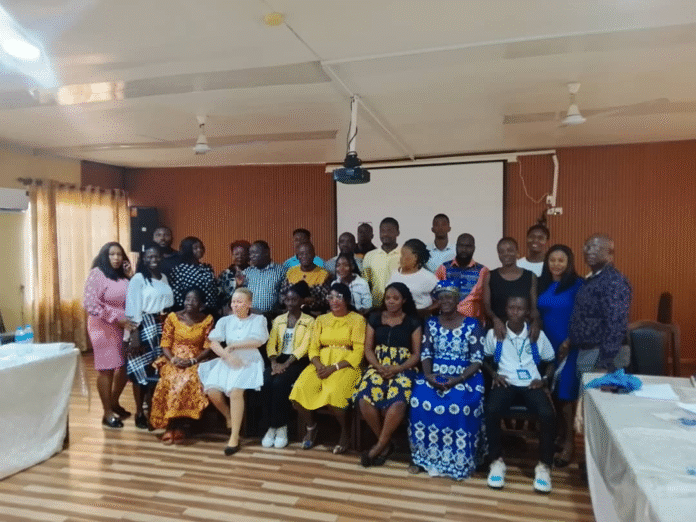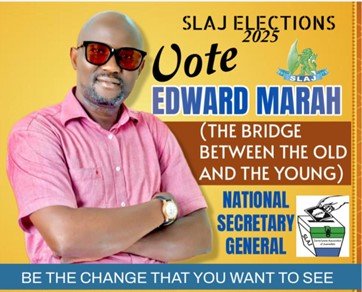BAN on Pre-budget Engagement on Women, Marginalized and Vulnerable Groups
By Mohamed Konneh
The Budget Advocacy Network with support from Christian Aid on Monday 4th August 2025 held a one-day Pre-Budget Engagement on the Needs of women, Marginalized and vulnerable Groups. The engagement held at the CCSL conference Hall, Kingharman Road, in Freetown brought together women groups, Civil society and the media together.
The engagement is part of project activities implemented by Budget Advocacy Network, 50/50 and supported by Christian Aid Sierra Leone.
Speaking during the engagement, the Policy Analysts At Budget Advocacy Network, Abu Bakarr Tarawally, began by looking at economic justice and how it affect women including other vulnerable groups.
He said Economic justice refers to a set of moral principles that aim to ensure fairness in economic policy, opportunities, and outcomes—particularly in addressing poverty, inequality, and social exclusion.Mr. Tarawally noted that the International Labour Organization (ILO) describe Economic justice as one that involves equitable access to decent work, fair wages, social protection, and the right to organize and be heard in economic decision-making. ”While the Center for Economic and Social Justice (CESJ), described Economic justice as one that includes three key principles: participative justice (fair participation in economic life), distributive justice (fair distribution of resources), and social justice (removing barriers to economic participation).”Economic justice is about transforming the economy to work for everyone, not just a privileged few—ensuring women, marginalized communities, and the poor benefit fairly from growth and development.
This he said aims to make the economy more successful and fairer by eliminating discrimination and creating opportunities for all to succeed regardless of sex, race, age, disability, color, creed, national origin, religion, or genetic information.
The Budget Advocacy Policy Analyst said Economic justice is rooted in the idea that an economy will be more successful if all market participants are treated fairly.
“As such, the goal is to create opportunities for everyone to potentially thrive and prosper, with justice working in lockstep with that concept.”
Mr. Tarawally explained the many challenges of Economic justice categorizing them into segment.
Income Inequality is among challenges of economic justice noting it is the persistent gap between the rich and the poor remains a significant challenge. Policies and mechanisms to reduce income disparities are essentialAccess to Education and Training is another challenge adding that the unequal access to quality education and vocational training limits economic mobility. Bridging this gap is vital for empowering individuals to participate fully in the economy.Discrimination and Bias is another challenge as this is based on race, gender, ethnicity, or other factors affects economic opportunities. Overcoming biases in employment, lending, and business practices is essential.Labor Market Shifts is another challenge and that Technological advancements and globalization lead to changes in job markets. Ensuring a just transition for workers affected by these shifts is critical.
Affordable Healthcare is also another challenge and that Access to healthcare impacts economic well-being. High medical costs can push families into poverty. Universal healthcare coverage is a step toward economic justice.Economic Justice Policies and Laws in Sierra Leone include Local Government Act, 2022 that focuses on Decentralisation and local development. Section 20(2)(k): Empowers local councils to promote economic development, including women’s participation.Section 22(1): Mandates councils to develop inclusive local development plans and budgets.Section 92(2): Institutionalises participatory budgeting and planning processes at the local level.Source: Government of Sierra Leone, Local Government Act 2022. Emmanuel Alieu from Christian Aid Sierra Leone while making his statement thanked BAN for holding such an important engagement.
He said the engagement is part of the PACE project and that it is critical to the work of BAN and the aspect of accountability.
“Our work at Christian Aid support taxation. We want to see where tax work for the people especially women. Our work also look at issues of accountability within the governance system. This is the more reason why Christian Aid support the critical work that BAN is doing, he said.
The engagement ended up with the various groups putting together their felt needs that will be transmitted for the attention of government.




